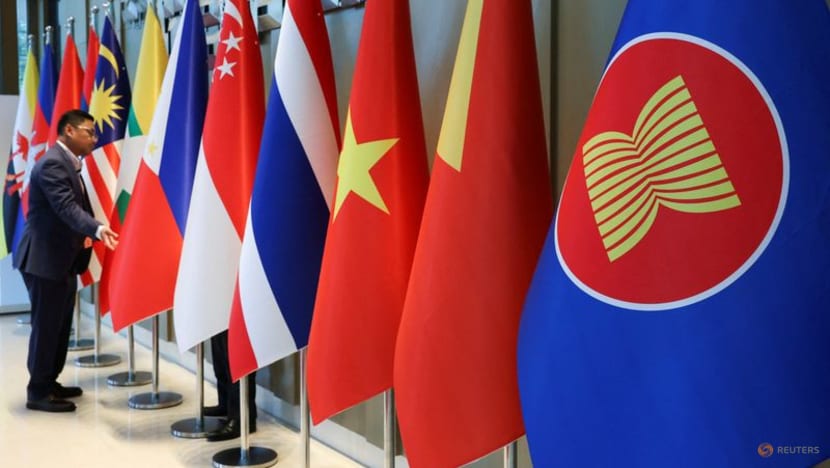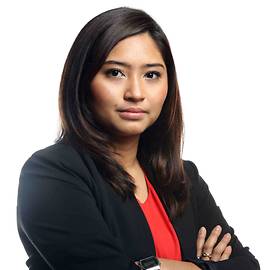Tariffs, regional issues among focus at upcoming ASEAN foreign ministers’ meeting
The talks come at a time of growing pressure to prove the bloc’s relevance amid global uncertainty and a range of regional challenges.

The ASEAN flag is placed alongside the flags of its member countries ahead of the ASEAN Foreign Ministers' Retreat in Langkawi, Malaysia January 17, 2025. REUTERS/Hasnoor Hussain

This audio is generated by an AI tool.
KUALA LUMPUR/SINGAPORE: This week, foreign ministers from the Association of Southeast Asian Nations (ASEAN) are set to meet for talks and hold discussions with the regional grouping’s key dialogue partners.
The bloc’s 58th Foreign Ministers’ Meeting comes at a time of growing pressure to prove its relevance amid global uncertainty and a range of regional challenges.
The domestic political situation in Thailand – one of the founding members of the bloc – remains fluid, after a caretaker prime minister was appointed last week alongside a reshuffled Cabinet.
This followed the suspension of Prime Minister Paetongtarn Shinawatra from duty amid a territorial dispute with fellow ASEAN member Cambodia.
Myanmar’s long-drawn crisis continues to be a key issue, despite some progress made at the ASEAN Summit in May.
“We are definitely moving the needle forward towards some form of resolution (on Myanmar),” said Dr Mohd Faiz Abdullah, chairman of the Institute of Strategic and International Studies Malaysia.
“That said, (ASEAN members) have … to square out (other) outstanding issues pertaining to so-called hot button cases, like the South China Sea code of conduct and matters that impact the geopolitical configuration.”
BOLDER REFORMS
On Saturday (Jul 5), Singapore’s Prime Minister Lawrence Wong called for bolder reforms within ASEAN to reduce trade and investment barriers and link up physical infrastructure.
Mr Wong said Singapore fully supports ASEAN chair Malaysia's efforts to push for these reforms. He added that the momentum will continue when the Philippines takes over the rotating chairmanship next year, and Singapore the year after.
He added that Singapore will work closely with regional and global partners to keep the bloc strong, effective and relevant.
Mr Wong reflected on the founding of ASEAN in 1967 – a period also marked by the global turmoil of the Cold War.
He said the unity of the founding leaders laid the foundations for stability in the region.
"ASEAN has seen conflict before. We were once an arena for proxy wars by the major powers. We do not want that to happen again. Neither can we afford to have disputes divide us,” he added.
“Instead, we must work together to preserve peace and stability; and to keep ASEAN open and inclusive – a region that is not dominated by any single power, but where all the major powers are engaged and invested.”
With a population of 700 million people, and as the fifth largest economy in the world, Mr Wong said there is more that ASEAN can do to unlock its full potential, and highlighted the need for closer integration.
"Today, ASEAN supply chains already span multiple countries, leveraging our complementary strengths,” he said.
“We must make ASEAN a more seamless and competitive single market – one that attracts businesses and investments looking for alternatives in a more fragmented global economy.”
ASEAN & US TARIFFS
Such reforms are growing more urgent with United States President Donald Trump’s looming tariff deadline on Wednesday, said observers.
Mr Trump’s second presidential term has reintroduced uncertainty into global trade and raised the stakes for export-reliant economies in the region.
“One of the biggest concerns is that ASEAN’s foreign policy should not be allowed to be continually guided and influenced by the … tectonic movements of Trump's outpourings,” said Institute of Strategic and International Studies Malaysia’s Dr Faiz.
“So, the first thing that has to be done (when) ASEAN foreign ministers get together (should be to) take a common position, for example, in relation to tariffs.”
This week’s agenda also includes a ministerial meeting of the Conference on Cooperation Among East Asian Countries for Palestinian Development (CEAPAD).
The conference is led by Malaysia and Japan to accelerate efforts for the reconstruction of war-torn Gaza.
Additionally, there is the ASEAN Regional Forum, one of Asia’s largest multilateral political and security platforms, which will feature 27 participants, including the 10 ASEAN members and key global partners such as the US, Russia and China.
Observers said the forum will likely feature strong rhetoric and calls for regional solidarity even as underlying divisions remain.
"They may express their solidarity, and they may use aspirational language that Asia should unite, the intra-regional trade in ASEAN should be further enhanced to insulate ourselves from the turbulence of whatever Washington DC is doing right now,” said Professor Phar Kim Beng, who specialises in ASEAN studies at the International Islamic University Malaysia.
The bloc’s foreign ministers are also expected to hold separate sessions with ASEAN’s key dialogue partners.
The meetings will take place in the Malaysian capital of Kuala Lumpur from Jul 8 to 11, under the theme “Inclusivity and Sustainability”.
















